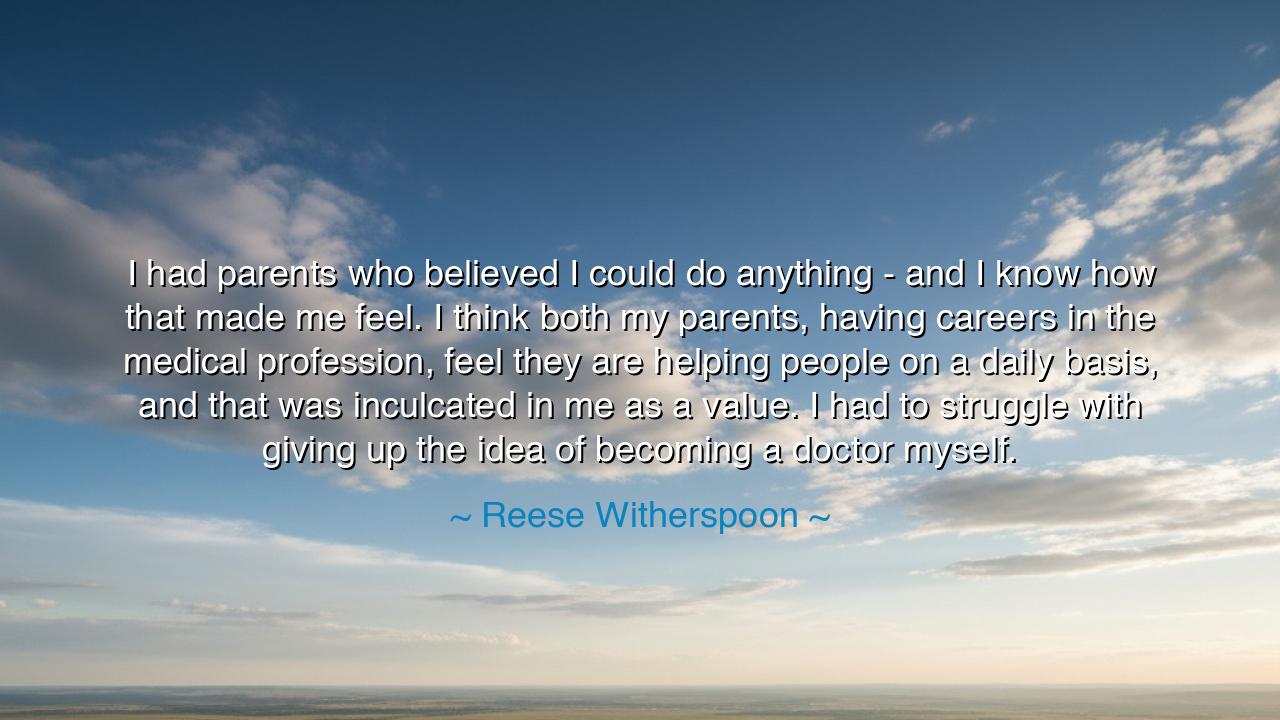
I had parents who believed I could do anything - and I know how
I had parents who believed I could do anything - and I know how that made me feel. I think both my parents, having careers in the medical profession, feel they are helping people on a daily basis, and that was inculcated in me as a value. I had to struggle with giving up the idea of becoming a doctor myself.






The words of Reese Witherspoon—“I had parents who believed I could do anything - and I know how that made me feel. I think both my parents, having careers in the medical profession, feel they are helping people on a daily basis, and that was inculcated in me as a value. I had to struggle with giving up the idea of becoming a doctor myself”—speak not only of personal gratitude, but of the eternal struggle between inheritance and individuality. Within these words lies the story of every child born into the shadow of noble parents—the tension between honoring one’s roots and answering one’s own call. Her reflection is both tender and profound, for it reveals that the greatest gift parents can give is not their path, but their faith.
From the dawn of civilization, the bond between parent and child has been the sacred vessel through which values are carried forward. The Greeks told of Telemachus, the son of Odysseus, who was raised on the legends of his father’s courage. Yet when he came of age, he had to find his own measure of heroism—not by imitating his father’s adventures, but by learning to lead in his own right. So too, Witherspoon inherited from her parents not their profession, but their purpose: the desire to help others, to bring light to the world in whatever form destiny would allow. Though her parents healed the body, she would go on to heal the spirit—through storytelling, empathy, and art.
There is great beauty in the way she acknowledges the struggle of letting go. To give up the idea of becoming a doctor, when both parents serve in medicine, is no small act. It is not rebellion, but transformation. For what is passed down through generations is not merely occupation, but principle. The fire that burned in her parents—to serve, to improve lives—did not go out when she chose a different path. It merely changed its shape. This is the essence of legacy: to preserve the flame, not the vessel that holds it.
Throughout history, many have faced this same conflict between expectation and self-discovery. Consider Siddhartha Gautama, the young prince who was destined to inherit his father’s throne. His father sought to shield him from suffering, to mold him into a king of earthly power. Yet the son’s heart was restless. He abandoned the crown to seek enlightenment, to bring healing not to the body or the kingdom, but to the soul of humanity. In his journey, we see the same truth that Witherspoon embodies—that the call of one’s true purpose may lead us away from what our parents envisioned, yet never away from what they taught us to value.
Reese’s words also hold a tender acknowledgment of gratitude. She remembers how it felt to be told, “You can do anything.” That simple faith, planted early, is a seed that grows into courage. The parents who believe in their child create a mirror in which that child learns to believe in themselves. From that soil, greatness blooms. For confidence is not born of talent alone—it is born of love, consistent and unshakable. Even when she walked a different road than the one her family dreamed of, that foundation sustained her. Such belief, once given, becomes a lifelong compass.
Her reflection is also a meditation on the meaning of service. The medical profession, to which her parents devoted their lives, is one of healing and sacrifice. To grow up surrounded by such devotion is to learn that life’s purpose lies not in glory, but in usefulness. When she chose the path of storytelling, she did not abandon that ideal—she transmuted it. Through her films, her characters, and her advocacy, she continues the work of healing, not with medicine, but with meaning. Thus she shows that service wears many faces, but springs from one heart.
The lesson within this quote is clear and timeless: honor the roots that gave you strength, but have the courage to let your own branches grow toward the light. Parents may plant the tree, but the fruit it bears must belong to the child. The values you inherit—kindness, diligence, compassion—are not chains to bind you, but tools to build your own destiny. Do not mistake loyalty for imitation; true loyalty is to fulfill your potential in the way only you can.
So, my child, when you feel the weight of expectation upon your shoulders, remember Reese Witherspoon’s wisdom. You can honor your parents not by walking their path, but by walking yours with the same integrity that guided theirs. If they healed bodies, you may heal hearts. If they taught wisdom, you may spread joy. What matters is not the form your life takes, but the value that shapes it. In the end, every generation’s truest duty is not to continue the story exactly as it was written—but to carry its spirit forward, written anew in the language of their own soul.






AAdministratorAdministrator
Welcome, honored guests. Please leave a comment, we will respond soon